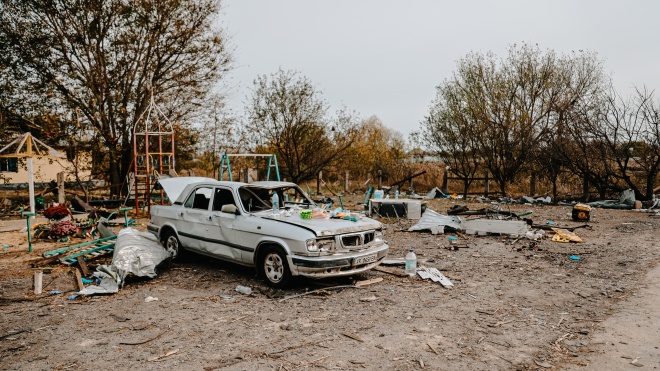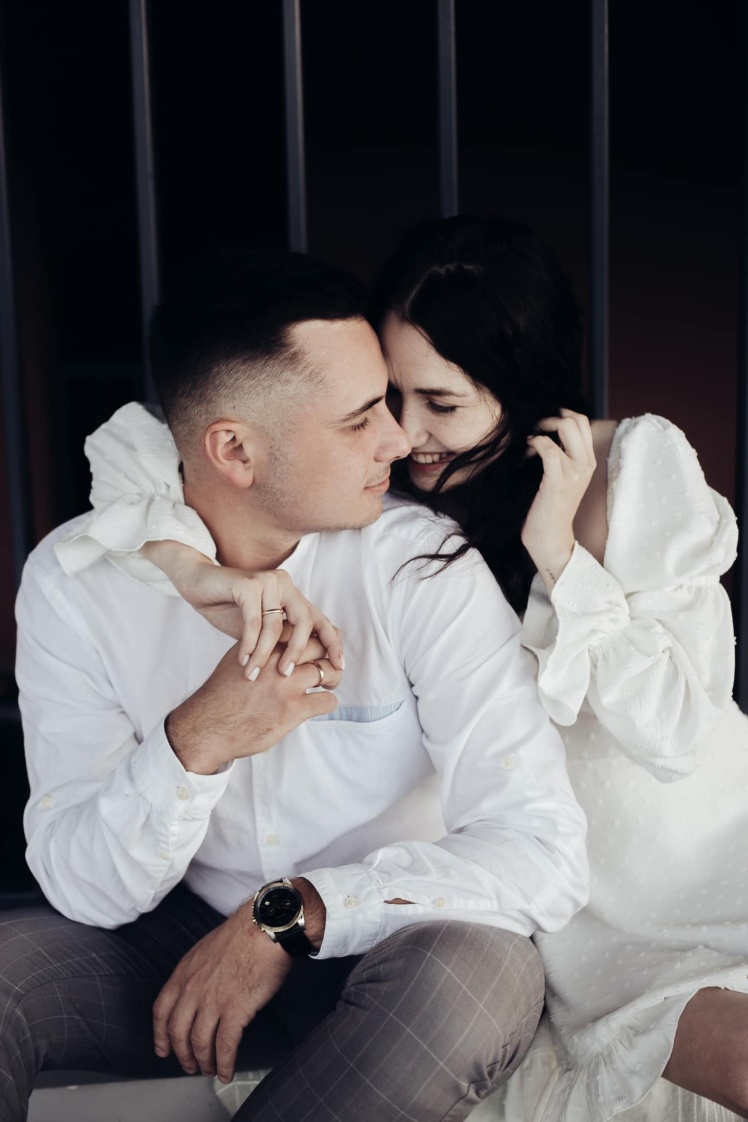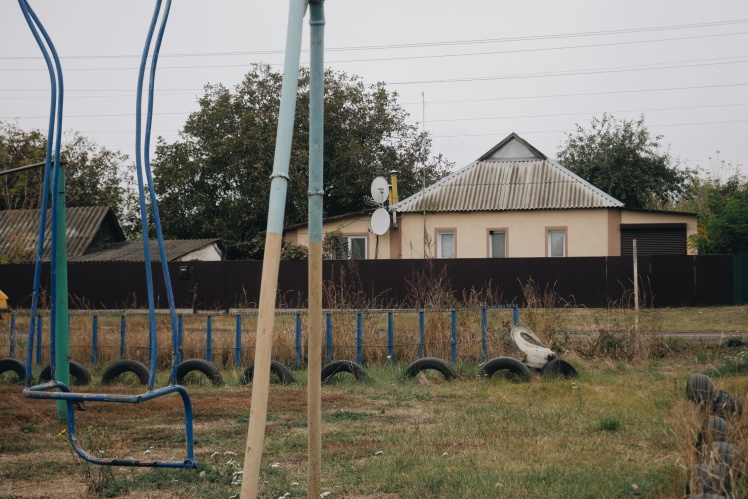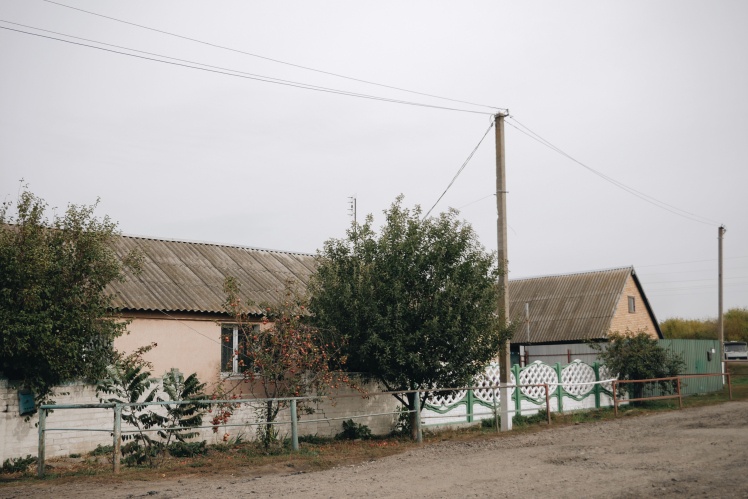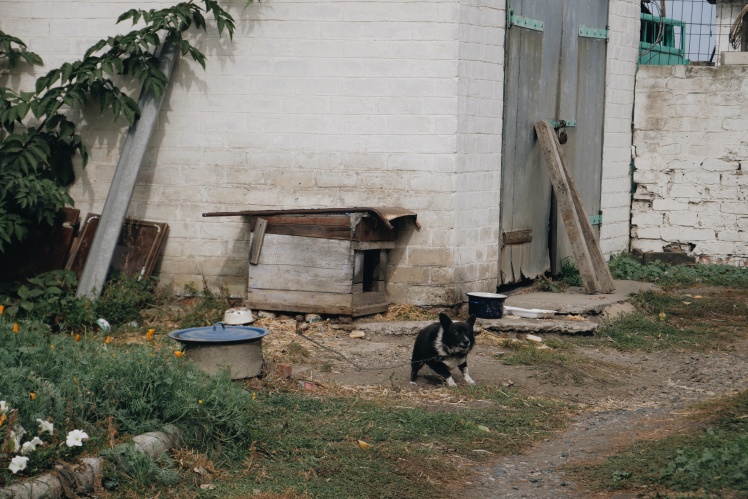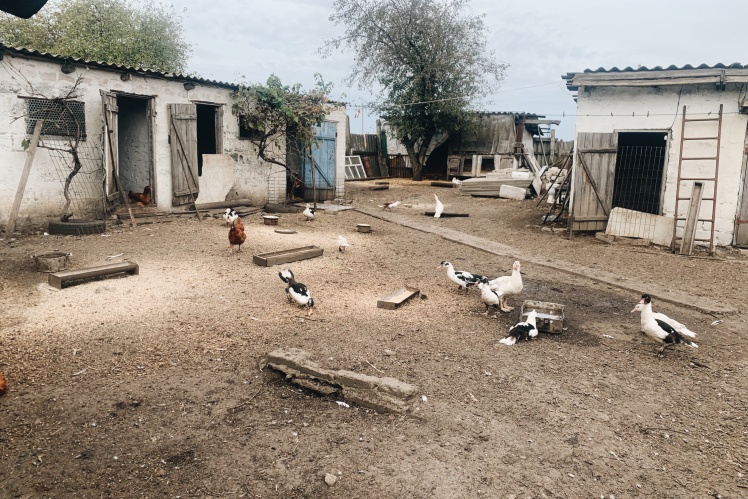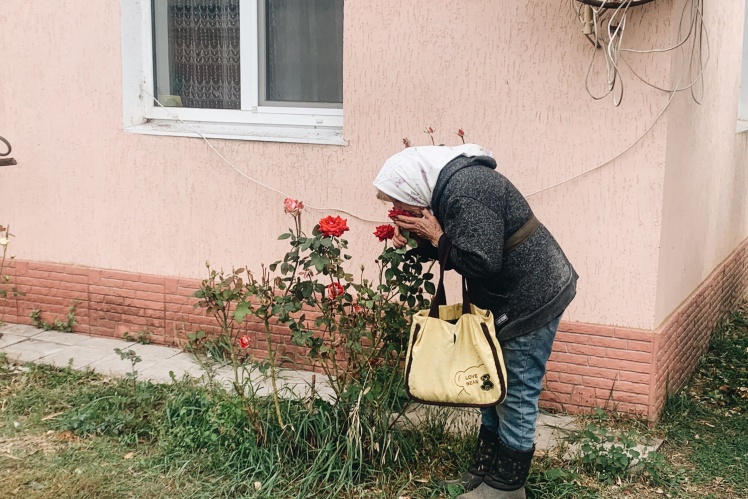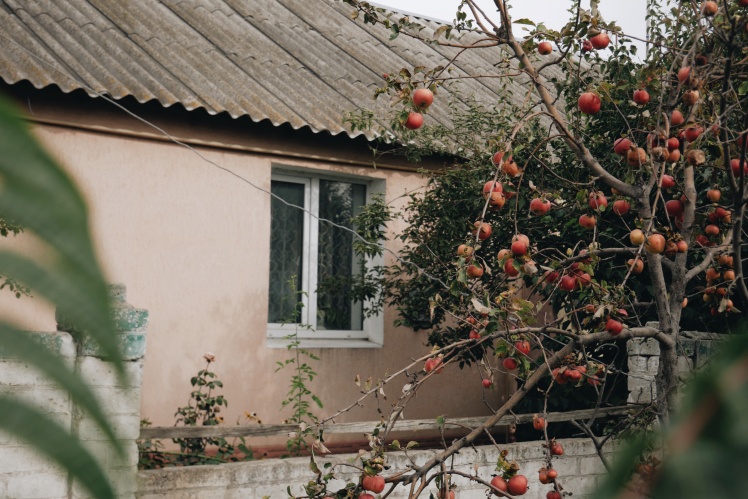The material is written based on interviews with The Reckoning Project (Ukraine Testifies) — a multinational group of journalists and lawyers documenting war crimes in Ukraine.
1.
Military Andriy Kozyr, who was reburied in Grozny on October 5, lived there all his life, married a neighbor girl, Alina. Together they raised two children — son Denis and daughter Lisa. The family spent the last few years in Poland — they went there together to earn money. Andriy and Alina planned to return home, were renovating their country house. The children wanted to stay. Liza got married in Poland. All plans were changed by a full-scale invasion.
Denys and Nina Kozyri.
Facebook / «Бабель»
Father and son — Andriy and Denys Kozyri — returned to Ukraine and went to fight as volunteers in March 2022. They were sent to Luhansk region. In the first month of the invasion, 49-year-old Andriy was seriously wounded near Popasnaya and died in a hospital in the Dnipropetrovsk region, where he was buried. Groza was then occupied.
23-year-old Denys fought for another year, and at the beginning of the summer of 2023 he resigned due to his health. He, like his father, had very poor eyesight — there were no brothers with such in the Armed Forces, but in the spring of 2022, no one looked at it. After the service, Denys returned to his parentsʼ home. He came with his wife Nina. The couple got married in the summer of 2022. They knew each other for a long time — Nina is also from Groza.
The villagers first heard about the reburial from Denis and the parents of Andriyʼs wife, Nina and Mykola Hrybov. They told friends and neighbors about the plans. In the village, where after the great invasion there were approximately 250 people left and where everyone was a relative, godfather or close friend, the word spread quickly. Soon everyone knew about the reburial.
"We found out that Andryushka would be brought to the village two weeks before it happened," says Valentina Kozienko.
Valentina Kozienko lives opposite the cafe. The explosion in her house broke the windows and blew off the roof. She did not go to the wake by chance — the pressure rose.
Getty Images / «Babel'»
She lives on Zelena Street, the same street where Denys lived with his family. Valentina adds, there was no talk of a wake at first, and few people knew the exact date either.
- But we live opposite the cafe. A day before the reburial, she saw that the door was open, the woman recalls. — Our cafe has not been open since the beginning of the war. And since it is now open, I understood that they are preparing for the wake.
Rural cafe "Suputnyk" was located in a small one-story building — a maximum of 150 square meters. There used to be a kindergarten in it, but it was closed and sold to an entrepreneur from the neighboring village of Shevchenko, Anatoly Tverdokhlebov. His relatives are from Groza, so the man is considered a local here.
Tverdokhlebov remodeled the kindergarten and divided it into two parts. There was a shop in one, and a cafe behind the wall. Nearby is a first aid station, an abandoned bathhouse and a childrenʼs playground. There were no other public institutions in the village. People appreciated the store — if it werenʼt for him, they would have to go to the neighboring village of Shevchenkove for bread, which is five kilometers away.
Before the Great War, weddings and wakes were held in the cafe. When the village was occupied in March 2022, the institution closed and did not reopen even after the de-occupation in September of the same year. Over the past year, several wakes were held there — people contacted the owner and made arrangements. It was the same this time.
At the end of September, Nina and Mykola Hryby told their fellow villagers that they would rebury their son-in-law on October 5 or 7, as soon as the body was taken from the Dnipro. On the third of October, Mykola Hryb came to his friend Vasyl, who lived next door to Denis.
- Kolya said that he was at his grandsonʼs house. Tomorrow, the two of them will go to Dnipro to pick up Andrii. I was asked to help. While they are gone, take his girls wherever they say. His daughter and granddaughter returned from Poland, says Vasyl. — I say: "No questions, Kolya." What do you need?"
Vasyl helped the Mushrooms with reburials and memorial services.
Юрій Чорнобук / «Бабель»
At the Hrybsʼ home, there was vodka and water on the memorial table, Vasyl recalls. On the fourth of October, he took everything to the cafe. He also took the family to Shevchenkiv for flowers and to the bank for money to pay for the funeral.
The farewell ceremony began on October 5 at 11 am. Vasyl brought a priest from Shevchenko to the funeral — there is no church of his own in Grozny. Half a hundred people gathered in front of the yard of Denis and Nina Kozyryv — mostly residents of Zelena and Samarska Streets. Relatives and acquaintances from Shevchenko and neighboring villages also came.
Around 12 oʼclock, the procession went to the cemetery, it is a twenty-minute walk from the Kozyry courtyard. They put up a blue-yellow flag and wreaths in the same colors. From there, everyone went to a cafe together. Kozyri invited fellow villagers there even during the farewell.
The grave of soldier Andriy Kozyry, who was reburied in Grozny.
Яків Ляшенко / «Бабель»
"They ordered a table for a hundred people and agreed that it could be 120," says Olga Dontsova, a close friend of Alina Kozyr.
She did not go to the wake, because her brother Oleksiy Dyachenko died in the morning that day. Alina called Olga after the reburial and persuaded her to come to the cafe for at least half an hour. But she refused — she said goodbye to Andrii at the cemetery and began to prepare for her brotherʼs funeral.
Russia constantly fires at civilians during funerals
On October 11, 2023, Russians shot drones at employees of the ritual service in the village of Antonivka, Kherson region. The shelling happened at the cemetery during a funeral. Three men were injured.
On July 4, 2023, the Russians launched "Iskander" at people in Pervomaisk, Kharkiv region. They saw off Oleh Fadeyenko, a fighter of the special unit of the Ukrainian Armed Forces "Kraken", on his last journey. 43 people were injured, including 12 children.
On July 1, 2023, the Russians covered the cemetery with artillery in the city of Bilopylla, Sumy region, when the soldier Serhiy Popyk was buried there. Then no one was hurt.
On December 10, 2022, the Russians fired mortars at the funeral of a soldier in one of the border villages of the Sumy region. The law enforcement officers do not disclose the name of the settlement. The Russians shelled the yard and the road near the soldierʼs house. People managed to hide.
2.
Lunch was ordered for 1 p.m. Vasyl, while Andriy was being buried, took the priest to Shevchenkov, returned to the village around one oʼclock, was tired and decided not to go to lunch. I saw Mykola Hryb driving his Volga on the road towards the cafe.
People entered the cafe at approximately 1:10 p.m. At 13:12 there was an explosion. The time of arrival is remembered by Yevhen Pirozhok, a neighbor of Hrybov — after the explosion, he grabbed the phone and started calling his parents, who had gone to the wake. They did not answer. The rocket arrived after almost all the people from the funeral had entered the premises.
"The earth shook, and we were thrown by a shock wave," says Serhiy Pletinka, whose house is directly opposite the cafe. At the time of the explosion, he and his mother were in the summer kitchen, preparing to have dinner. — Shelves with dishes fell on my mother, sheets of iron came off from the summer kitchen, and I collapsed. An air alarm howled. I shouted to my mother: "Crawl into the grave! It will be now." But there was only one explosion.
Sergey was the first to run to the cafe. I could not see anything in the black smoke and concrete dust. I only noticed that there was a fire in the cafeʼs kitchen, I heard how everything around me was cracking from the heat. Serhii began to feel the stones and throw them away. Heard a moan and saw the shop assistant. The womanʼs legs were crushed by the refrigerator, and a concrete slab lay on top of it.
Юрій Чорнобук / «Бабель»
- She was covered in blood. I started to pull it out, the stove does not give, — says Serhii. — Ran home. Grabbed bandages and peroxide. Then he brought water in an eggplant. Poured fire.
Brothers Yevhen and Yuriy Pirozhka remember that they arrived at the cafe five minutes after the explosion. They saw their parentsʼ car. They climbed onto the ruins and began to look around.
— A woman was sitting on the rubble. I did not recognize her. Next to her was a little man. He kept repeating: "Whereʼs my Tanyuha," Yevhen Pirozhok says. — I told him that I just arrived and I donʼt know. The man was asleep up to his waist. I told him that the ambulance will come now, that they say that you cannot be taken out without doctors, you will bleed. He asked to put something under his head. I say: "There are only stones here." He: "Put stones." Raised his head and put the adobe. So he died.
Evgeny and Yuriy threw stones away with their hands. It seemed to them that a maximum of 15 people were under the rubble. They dug up the lid of the table, and found the father and mother under it. Next to them lay Anatolii Panteleyev, Yevhenʼs best man. All are dead.
Ambulances and rescuers arrived in the village within 20 minutes. The rubble was dismantled for two days. A fragment of a Russian Iskander missile was found near the cafe. The bodies of all the dead were taken to the morgue in Kharkiv. The people who were near the door of the cafe were not disturbed by the explosion. They were the first to be found, and their relatives recognized them back in Grozny.
The bodies of the dead near the cafe.
Getty Images / «Babel'»
On the eve of the funeral, tables were placed along two walls in the cafe. The rocket hit the building not in the center, but exactly where the tables were. Now there is a gap in this place. Due to the high accuracy of the strike, law enforcement officers and locals had no doubt that the Russians had a gunner among the locals.
3.
Law enforcement officers started looking for him or them in the first hours after the explosion. They interviewed the villagers, checked their phones. The first to come under suspicion was the owner of the cafe, Anatoly Tverdokhlebov, who was questioned on the day of the tragedy. According to Serhiy Bolvinov, head of the Police Investigation Department in the Kharkiv region, the SBU previously brought Tverdokhlebov to "criminal responsibility for collaborative activity." What exactly he was accused of, the police and the SBU refuse to specify, as well as to say what the courtʼs verdict was. This time no evidence was found against him.
Tverdokhlebovʼs loved ones died in the cafe — the Panteleev family: his sister and her husband and her niece and her husband. The niece has four children left, now they are in Grozny with their grandfather, who by chance did not go to the wake.
On the morning of October 11, the Prosecutor Generalʼs Office and the SBU reported that the rocket was fired at the cafe by brothers Dmytro and Volodymyr Mamony, natives of Groza. During the occupation, they collaborated with the Russians, and after the liberation of the village, together with another brother and father, fled to Russia. According to the investigation, the men corresponded with locals and collected information about reburials. In confirmation of this, the spokesman of the Security Service of the Kharkiv region, Vladyslav Abdula, posted screenshots of correspondence between the Mamons and people whose names the SBU refuses to name. Investigators say that people were "led into the dark". However, correspondence suggests the opposite.
СБУ / «Бабель»
The SBU does not specify why Mamon fired a rocket at the cafe. One of the assumptions of the investigation is that military men who wanted to be killed could have gathered for the reburial. However, only civilians and several ex-servicemen died in the cafe — the son of the reburied Andrii Denys and his distant relative Ivan Yaremenko.
4.
Mamon brothers grew up in Grozny. Volodymyr is 30 years old, he is the eldest, the youngest Dmytro is 23, and the middle Oleksandr is 26. In the last years before the Great War, they did not live in Grozny, their father Serhiy, a former policeman, stayed there. He was engaged in agriculture, he hired villagers who cultivated his land and harvested crops.
Volodymyr Mamon lived in the nearby village of Chkalovske in Kharkiv Oblast, and since 2019 he has been working as a policeman in the convoy service, transporting arrested persons to court and prison. Dmytro and Oleksandr worked as policemen in Kupyansk in the last years before the invasion.
"When the Russians entered the village in March 2022, Serhii Mamon met them, so to speak, with Russian flags and flowers," says Yevhen Pirozhok. He heard it from his neighbors. — His sons also supported the Russians. It turned out that half of our village are collaborators. Although they were not like that before. Did I not notice that...
From the first days of the occupation of the Kharkiv region, the three Mamon brothers went to work in the occupation police. Volodymyr received from the Russians weapons and a car "Niva" painted with the letters Z. Residents of Groza saw him behind the wheel. Oleksandr and Dmytro joined the occupation police in Kupyansk.
"The village knew about it," says Lyubov Pletinka. — Their father told.
Lyubov Pletinka near the paramedic station, which was behind the cafe. It was also smashed by the blast wave. Lyubov does not dare to come closer to the cafe — he says that it is painful to look at.
Юрій Чорнобук / «Бабель»
During the occupation, her son Serhiy, who was the first to run to the cafe after the explosion, was captured twice by the Russians. In 2016 and 2017, Serhiy fought in the Donetsk region, a member of the ATO.
In the summer of 2022, her Serhii went to Shevchenkov to a hair salon, Lyubov Pletinka recalls. He met Volodymyr Mamon on the way out. He said that he needed help and asked to go with him. Serhii left, he was caught and taken to the local police, to the torture chamber. Lyubov came there in search of her son, met Volodymyr Mamon.
— I asked him why Sergei was detained. And he: "By martial law," says Lyubov. — As soon as we found out that Serhiy was in captivity, we burned his military documents. They were constantly looking for them. They came twice with searches. The father was threatened with a weapon — held to the head. I was told that the house would be demolished by a tank. Well, we already burned everything, thatʼs why they said that we donʼt have anything.
The first time Serhii was held captive for four days, constantly beaten, then released. The man went on foot to Groza, on the way home he met the father of the Mamon brothers. He threatened that when the Ukrainian military liberated the village, he and his sons would not be spared. Serhii did not have time to reach his house when the Russians came for him again and took him to the torture chamber in Kupyansk. There he was tortured with electric current. Dmytro and Oleksandr Mamon were not among the executioners, but Serhiy heard that they were serving the Russians somewhere.
The Prosecutor Generalʼs Office knew about Volodymyr Mamonʼs activities even when Kharkiv Oblast was occupied, and in July 2022 he was accused of collaborationism. According to the prosecutorʼs office, Mamon led a criminal investigation by the occupation police in Shevchenkov, kidnapped and interrogated people.
When the rocket landed in the cafe, the windows in Lyubov Pletinkaʼs house were broken.
Юрій Чорнобук / «Бабель»
5.
On September 7, 2022, the ZSU liberated Shevchenkov, on September 9 they entered Groza, and on September 10 they were already in Kupyansk. The day before, the Mamon family fled to Russia — three brothers and their father.
- Father left last. We saw how he ran away from the village, — remembers Yuriy Pirozhok. — It was necessary to grab him and tie him to a post. She fell like this.
For the last year, the court in Poltava has been sitting in the case against Volodymyr Mamon. The process was delayed because meetings are held once a month. Only now have they started interviewing witnesses.
In August of this year, the Chernihiv Regional Prosecutorʼs Office accused Oleksandr Mamon of treason and collaborationism. The prosecutor stated that the man worked as a road traffic inspector in the occupation police of Kupyansk.
Dmytro Mamon was not officially accused of anything before the rocket fire in Groza, now — of treason and working for the occupation police. He, like his brother Oleksandr, worked as a road inspector in occupied Kupyansk.
Residents of Groza react calmly to the official accusations of the Mamons. They say — and so they guessed about it.
The policemen in Shevchenkov are also tight-lipped. They refuse to communicate officially — this requires the permission of the management. Unofficially, they say: they knew that after the deoccupation, some residents of Groza and neighboring villages continued to communicate with the Mamons, but they could not do anything — people did not write statements, they just relayed them in private conversations.
Юрій Чорнобук / «Бабель»
"There is a lot of talk, but no one wants to be responsible," says one of the policemen.
In the Kupyan district, there are still many who supported the occupation authorities, says a police officer from Shevchenkiv. But even after collecting evidence about their crimes, it is difficult to get convictions. The last court decision literally finished off the policemen. On September 1, 2023, a court in the Poltava region acquitted Vyacheslav Artyukhov — he was accused of leading the occupation police of Shevchenko for several months.
Dozens of people testified against Artyukhov in court. It was said that during the occupation he threatened them with massacre, participated in the kidnapping of people, negotiated with the Russian military to export grain from the region. The occupation authorities wrote him a letter of thanks for all this, they were found after Shevchenkoʼs release. Among the documents found was also an employment contract on the acceptance and dismissal of Artyukhov from the occupation police. Artyukhovʼs lawyer argued that he sang Ukrainian songs during the occupation, for which the Russians beat him more than once. The judge considered the evidence of the investigation as doubtful and acquitted the man.
- Now he walks around the village as if nothing had happened. He also promises to take revenge, says a police officer from Shevchenko. — We are now standing with you near the ruins [cafe in Grozny] and counting the dead. But even after such tragedies, I am not sure that anything will reach the people. They communicate with collaborators as if they did not torture their relatives and are not now being killed by rockets.
Яків Ляшенко / «Бабель»; Getty Images / «Babel'»
6.
Serhii Mamonʼs house is closed in Groza. He lived in Samarska. This is the street with the most deaths. Every second house has a funeral.
Not far from Mamonʼs house is the house of Andriy Kozyryʼs father-in-law and mother-in-law, Nina and Mykola Hrybov. Near their house, red apples fall and rot on the ground. Mykola Hryb planted a tree 15 years ago, this year it bore fruit abundantly. In the yard, the dog Topi is barking on a leash, chickens and geese can be heard screaming. Maria Larionenko, a friend of the dead couple, comes to feed them. In the house of the Hrybovs there are unpacked belongings of the deceased daughter Alina and granddaughter Liza — they returned home from Poland the day before the reburial.
Up the street is the empty house of Denis and Nina Kozyry. Denys recently bought a car. Grandfather Vasyl, who helped with the reburial, came to watch and was happy for the boy. Now the car is driven into the garage, no one can drive it.
House of Nina and Mykola Hrybov.
Юрій Чорнобук / «Бабель»
People whom the Russians killed in Grozny
- Kozyr Alina is the wife of Andriy Kozyry, 44 years old. Worked and lived in Poland, came home the day before the tragedy.
- Kozyr Denys is the son of Andriy and Alina, 24 years old, a former military man.
- Elizaveta Kozyr is the daughter of Andriy and Alina Kozyry, 22 years old. Lived in Poland, came with her mother the day before her fatherʼs reburial.
- Mykola and Nina Hryba are Alina Kozyrʼs parents, 66 and 64 years old.
- Hryb Ivan is the brother of Alina Kozyr.
- Halyna Hryb is the wife of Ivan Hryb.
- Kozyr Nina is the wife of Denys Kozyry. She would have turned 21 on October 14. She worked at the Kharkiv Humanitarian and Pedagogical Academy, studied there in the 4th year.
- Lyudmila Chegodayeva is the mother of Nina Kozyr, 42 years old. Head of the local village club and volunteer.
- Anatoly Kozyr is Andrii Kozyryʼs uncle, 69 years old, retired. I came to the funeral with my own daughter.
- Olga Pashchenko is the daughter of Anatoly Kozyry, 34 years old, a housewife. A child was left without a mother.
- Kozyr Ihor is a cousin of Andrii Kozyr, 36 years old, a volunteer. He was with his wife Ksenia, who survived.
- Ivan Kozyr is the son of Igor Kozyr and Ksenia, 8 years old, studied in the 2nd grade.
- Eva Yaremenko is the sister of Andrii Kozyryʼs father-in-law, 70 years old.
- Hanna Malikova, 35, and Ivan Yaremenko, 34, are the children of Eva Yaremenko. Ivan is a former member of the ATO.
- Maksym Sirokurov is Andrii Kozyryʼs third-cousin nephew, 25 years old.
- Alina Sirokurova is Maksymʼs wife, 23 years old. Two children remained orphans.
- Svitlana Platonenko is Kozyryʼs godmother, 45 years old.
- Oleksandr Hlushko is Svitlanaʼs father, 70 years old.
- Oleksandr Nechvolod is the headman of Groza village, 60 years old.
- Vitaly Bilous, friend of Andriy Kozyry, 44 years old.
- Tatiana Kharbak, 52 years old.
- Iryna Kharbaka, 57 years old.
- Volodymyr Dolganin, 53 years old.
- Ponomaryov Anatoly and his wife Mamon Nataliya — 70 and 56 years old.
- Oleg Sapach — identified by DNA, age unknown.
- Mykola Androsovich, 63 years old.
- Tetyana Androsovich, 60 years old.
- Hryhoriy Kovalenko, 59 years old.
- Olena Krysevych, 60 years old.
- Bardas Raisa, 72 years old.
- Yuliya Bardas — age unknown.
- Solyanyk Tamara, 61 years old.
- Zapach Victoria — age unknown.
- Lyubov Kotenko, 50 years old.
- Anzhelika Gerasimenko, 47 years old.
- Olga Pilguy, 48 years old.
- Volodymyr Mukhovaty is a local lyceum teacher and his wife Svitlana Mukhovaty is 47 and 43 years old.
- Iryna Panteleeva is the sister of the cafe owner and her husband Valery Panteleev, 62 and 63 years old.
- Olga Panteleeva is the daughter of Valery and Iryna, 38 years old. She helped prepare the memorial dinner.
- Anatoly Panteleev is Olgaʼs husband, 42 years old.
- Valentina Korkh is a nurse from Shevchenko, 62 years old.
- Osipova Svitlana — 50 years old, helped with the memorial dinner.
- Oleksandr Khodak, 60 years old.
- Chikalo Hanna, 61 years old.
- Pirozhok Oleksandr, 65 years old.
- Tatiana Pie, 62 years old.
- Chepil Viktor, 69 years old.
- Chepil Lyubov, 61 years old.
- Valery Androsovich, 59 years old.
- Zoya Nechypurenko, 58 years old.
- Tatyana Mukhovata, 65 years old.
- Oleksandra Odegova, 74 years old.
- Valentina Fomenko, 70 years old.
Not all the victims of the cafe will be buried at the cemetery in Grozny — some of the people were from neighboring villages.
Getty Images / «Babel'»
